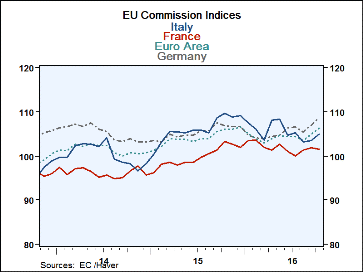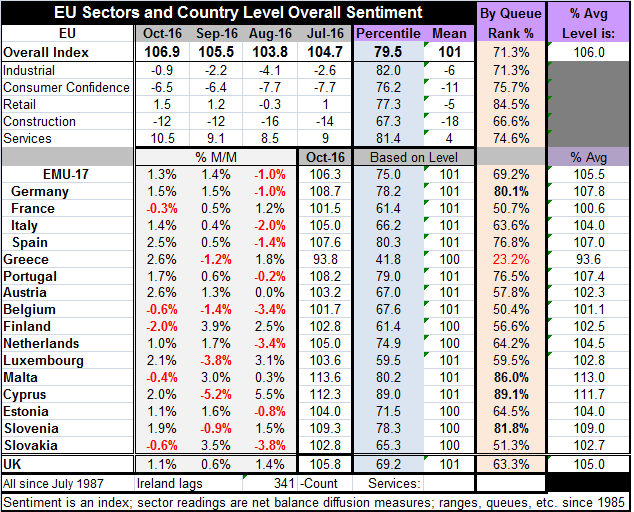 Global| Oct 28 2016
Global| Oct 28 2016EU Indices Show Solid Gains in October
Summary
The EU Commission monthly indices that chronicle gains in the EU and EMU areas show a rise in the EU area index to 106.9 in October from 105.5 in September. The 1.3% monthly rise is less than last month's 1.6% gain; otherwise it is [...]
 The EU Commission monthly indices that chronicle gains in the EU and EMU areas show a rise in the EU area index to 106.9 in October from 105.5 in September. The 1.3% monthly rise is less than last month's 1.6% gain; otherwise it is the strongest rise since December 2013. However, the headline index still marks a year-over-year drop of 0.5%.
The EU Commission monthly indices that chronicle gains in the EU and EMU areas show a rise in the EU area index to 106.9 in October from 105.5 in September. The 1.3% monthly rise is less than last month's 1.6% gain; otherwise it is the strongest rise since December 2013. However, the headline index still marks a year-over-year drop of 0.5%.
Of the five activity measures for the EU, only consumer confidence backtracked in October. The construction sector gauge was unchanged. Industrial sector strength showed up as the sector posted a sharp improvement, rising to a -0.9 net reading in October from -2.2 in September. But its net standing is still negative. Services saw the sector index grow strongly to a net reading of 10.5 in October from 9.1 in September. The retail index advanced in October to 1.5 from September's 1.2. The sector readings all have queue standings somewhere in the 70th percentile decile except for retailing which has an 84th percentile standing and construction with a 66th percentile standing. All of these are at least respectable levels. On balance, the sector gains are good in October, led by the industrial sector and followed up by a solid gain in services. The retail advance was small, consumer confidence was set-back and construction has flattened out. It has been a strong two months for these indices where the two-month change shows everything up sharply but the headline is still net lower year-on-year.
Turning to EMU member countries, only five of the 16 reporting countries showed monthly declines in sentiment in October, the same number as in October. Only Greece has a reading below its 25th percentile when ranked in its queue of data back to 1985. Four members have country level sentiment readings that are in the top 20th percentile historically (80th percentile queue standing or better); these are Germany, Malta, Cyprus, and Slovenia. The overall EMU standing is in its 69th percentile, a sort of no-man's land of being not too weak and not too strong but still not yet adequate.
Among the three largest EMU economies, France's sentiment index is barely above its midpoint with a 50.7 percentile queue standing. Italy has a 63.6 queue percentile standing. Spain has a 76.8 percentile standing. In the last the month, each of these countries has posted one monthly drop in its overall sentiment index over the last three months.
The EU framework agrees with the Markit sector indices as both of them show some degree of revival in the euro area in October with both the industrial and services sectors participating in the revival. Still, the money and credit growth situation in the euro area is lagging with neither money nor credit indicating any turnaround.
Geopolitical problems continue to haunt the region as a revival in NATO deployments in Europe raises the specter of the Cold War again. Meanwhile, OPEC and 'friends' are meeting to try to solve their dilemma about how to implement the production cut backs that will be required to underpin the price rise they seek. As the weekend starts, there is an air of skepticism about OPEC's prospects for success in this endeavor.

Robert Brusca
AuthorMore in Author Profile »Robert A. Brusca is Chief Economist of Fact and Opinion Economics, a consulting firm he founded in Manhattan. He has been an economist on Wall Street for over 25 years. He has visited central banking and large institutional clients in over 30 countries in his career as an economist. Mr. Brusca was a Divisional Research Chief at the Federal Reserve Bank of NY (Chief of the International Financial markets Division), a Fed Watcher at Irving Trust and Chief Economist at Nikko Securities International. He is widely quoted and appears in various media. Mr. Brusca holds an MA and Ph.D. in economics from Michigan State University and a BA in Economics from the University of Michigan. His research pursues his strong interests in non aligned policy economics as well as international economics. FAO Economics’ research targets investors to assist them in making better investment decisions in stocks, bonds and in a variety of international assets. The company does not manage money and has no conflicts in giving economic advice.
More Economy in Brief
 Global| Feb 05 2026
Global| Feb 05 2026Charts of the Week: Balanced Policy, Resilient Data and AI Narratives
by:Andrew Cates






